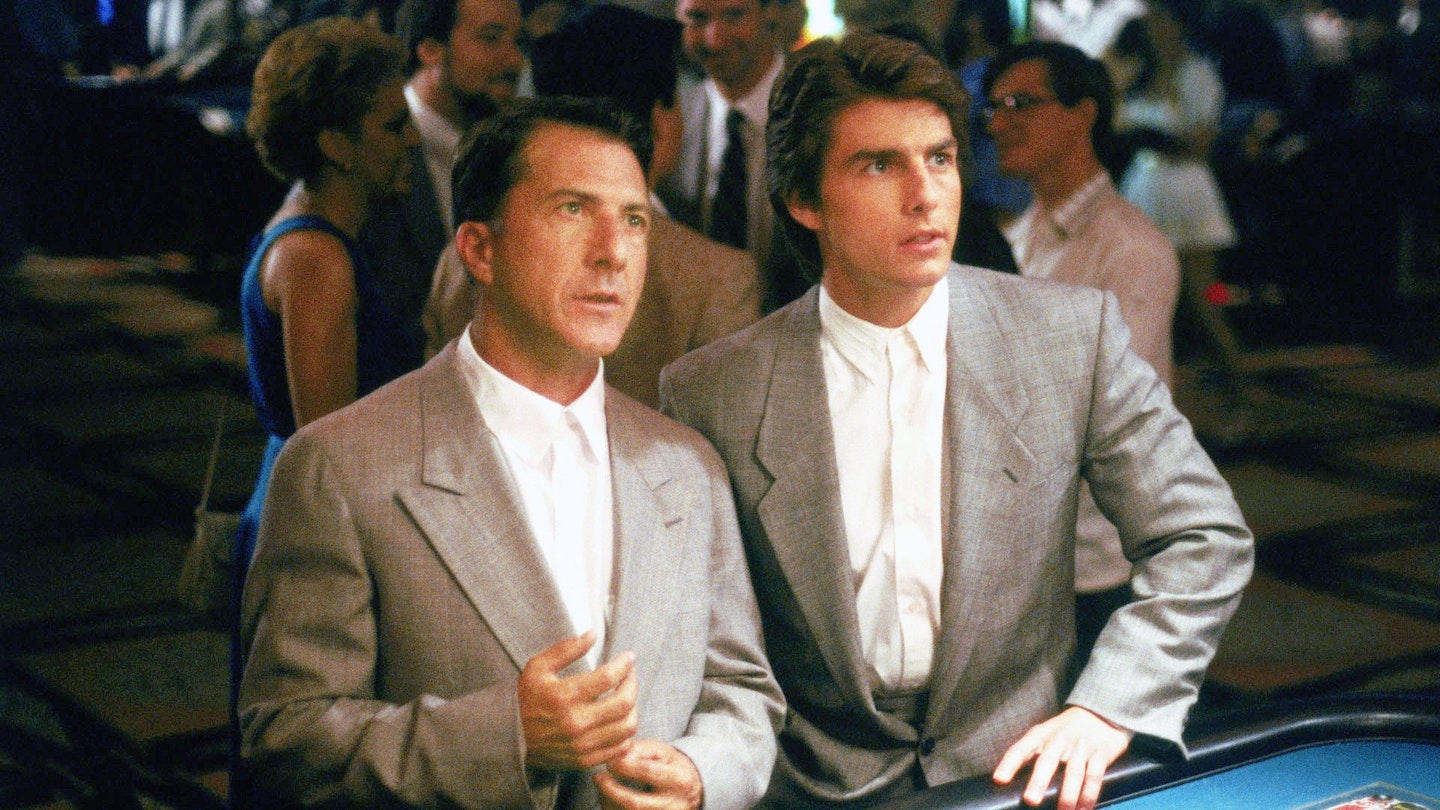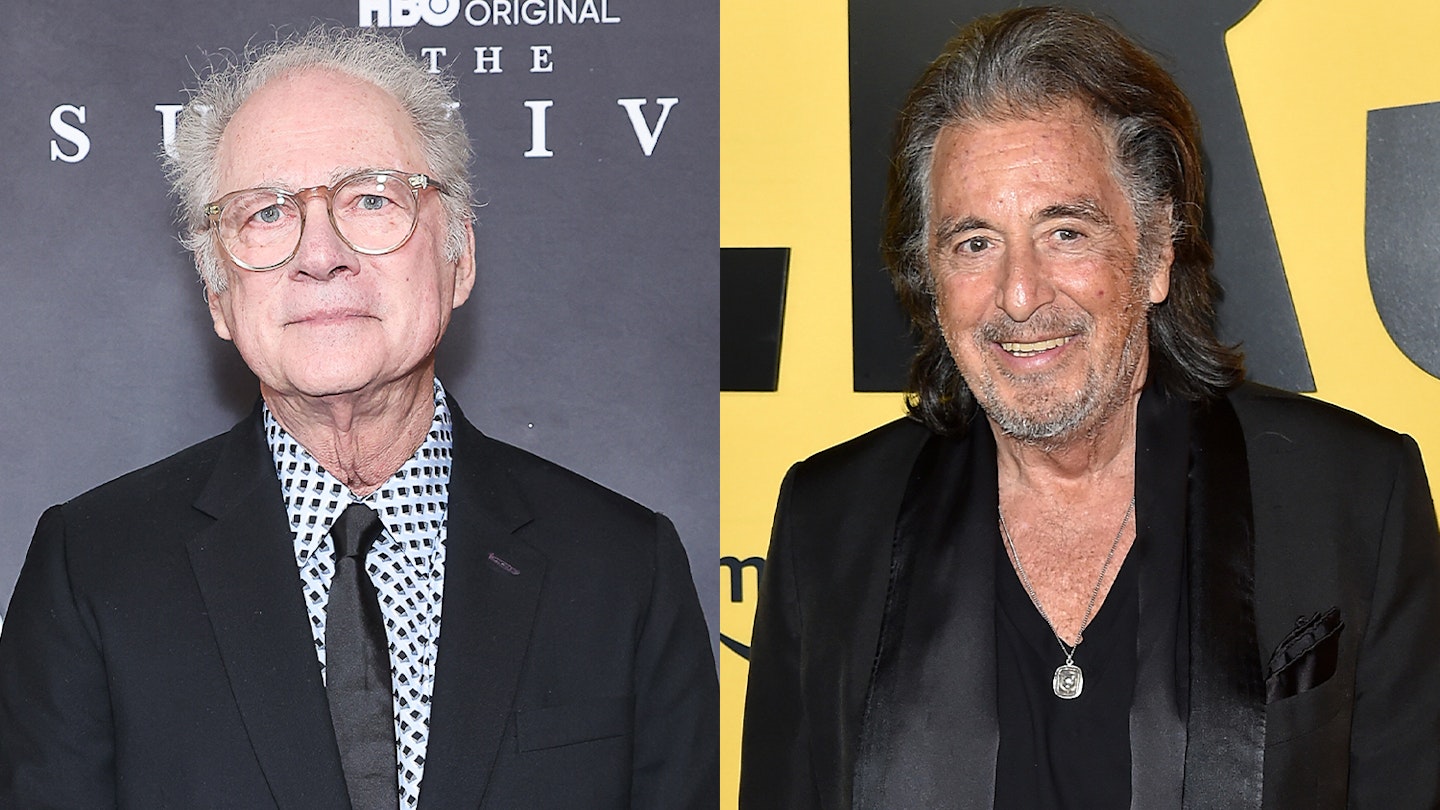It's sunset. Charlie Babbitt (Tom Cruise) has kidnapped his autistic savant brother (Dustin Hoffman) from a care home. They're stranded in the middle of the desert when suddenly they're surrounded by survivalists - brutal gang members out for the kill. Charlie grabs his gun. He knows they have no choice but to shoot their way out. He dons his Ray-Bans, the music kicks in.
If studio bosses had had their way, 'Rain Man' would have been a different movie. They insisted this action sequence go in one of the rewrites to pick up the pace. But then, if 'Rain Man's production schedule had gone at all according to plan it would have been a Marty Brest picture starring Bill Murray as the loveable retarded brother of uptight businessman Dustin Hoffman.
Just be thankful that studio bosses don't always get their way. 'Rain Man', the film that went on to win Oscars for Best Director, Best Picture, Best Actor and Best Original Screenplay, would not have been such a resounding success without the final unique grouping of talent.
The age gap between Hoffman and Murray as brothers may have been more believable, but despite Hoffman scooping the awards, Cruise is the one to watch. He makes the leap from film star to actor in this movie. Barely off screen for a moment, he has to go from being a nasty piece of work to someone that the audience can empathise with, while his co-star remains a wall of blank emotion and character tics. It's an ego-less performance that Cruise has rarely matched since.
Murray passed on the movie when he found out Hoffman was interested in playing the part intended for him. He knew it was the role that would get the plaudits, but as much as Murray has proved himself as a serious actor in recent years, there's no way he would have inhabited Raymond Babbitt the way Hoffman does. Hoffman spent a year working with autistic men and their families to understand their complex relationships. As a jobbing actor he'd worked in a psychiatric care home and he built on his experience from there, too.
Watching the extras on the DVD release allows you to glimpse the contemporaries on whom he based his performance. These were the men he thanked in his Academy Award acceptance speech, and one in particular is so close to Raymond in mannerisms and appearance it's hard to imagine the script wasn't written about him.
But the original script was slightly different. It was pitched by Barry Morrow, who'd previously written the Emmy-award-winning drama Bill, about a mentally retarded man who'd become a friend of Morrow's family. 'Rain Man' was a further exploration of that relationship. The title was chosen by Morrowís children after they went through a book of names deciding which sounded most interesting when mispronounced. It was very nearly No-man (Norman).
United Artists almost didn't pick it up because Warners were working on what was rumoured to be a similar project - 'Forrest Gump'. But then the 'Rain Man' in the original script was much closer to the Gump character: affectionate and always wanting to hug his cold brother. Hoffman was the one who pushed for the change to an autistic savant, who was the opposite in all respects. In fact, Hoffman's desire to make this crucial alteration and Marty Brest's reluctance to take it on board was one reason Brest parted company with the project.
The next director to sign up was Steven Spielberg. He brought in screenwriter Ron Bass to help him fine-tune the script and jetted off to Malibu with Cruise and Hoffman to work on the project. They all rented houses next to each other on the beach and spent the days swapping script notes and getting into the characters. This was a chance for Spielberg to fulfil the dream heíd had to work with Hoffman since seeing 'The Graduate' in the 1960s. He wasn't going to screw it up. But he never got the chance to realise his ambition.
In September, George Lucas said he was good to go on the third instalment of 'Raiders Of The Lost Ark', and Spielberg knew he wouldnít have time to get 'Rain Man' out and work with Lucas as promised. Regretfully he passed on 'Rain Man', breaking the news to the cast and Bass in person.
'Rain Man' was fast becoming the hot potato of Hollywood. Next to pick it up was Sydney Pollack. But his heart never seemed to be in it. He made the smart move of ditching the action sequence, but he wasn't keen on the whole idea of the road movie. 'I'd have made it if I could have stayed in New York', he commented, half joking.
But there was one man who couldn't stop thinking about Rain Man. Pollack's friend Barry Levinson had borrowed the script from him. He was driving across the desert one evening, watching the windmills spinning on the horizon, and he turned to his wife and said, 'You know, this would make a perfect backdrop for that bit where Charlie is talking to his girlfriend'. 'You should make that movie', she said. 'I can't', he replied. 'Sydney Pollack's making the movie'.
Fate dictated otherwise. Seven weeks before shooting, Pollack passed it over to Levinson. With a writers' strike looming, shooting could not be delayed. They already had a great cinematographer in Australian John Seale, who was good at seeing something bigger in the vast American landscape - as his work on 'Witness' and 'Children Of A Lesser God' had proved.
A couple of other pieces were needed to complete the puzzle. Hans Zimmer, then little known, was brought in to give a Cuban/African feel to the soundtrack. It was his first Hollywood movie and he pitched in with the perfect score, his haunting theme giving the brothers' journey a mystical feel. And then there was the unusual casting choice of Valeria Golino as Cruise's girlfriend. The part had been written as WASPish, blonde. Choosing someone whose native language was not English was a neat narrative trick; at a stroke Cruise's character had a reason to explain all his actions and in the simplest of terms.
This was not a movie that needed forced emotion; it played better because it was understated, because the ending is oblique and because it rang true. This film changed how many people perceived the autistic; suddenly they weren't 'retards' to be shut away, but intriguing individuals. Few movies really do this. But 'Rain Man' did something even rarer: it not only made the audience think, it made them happy.

